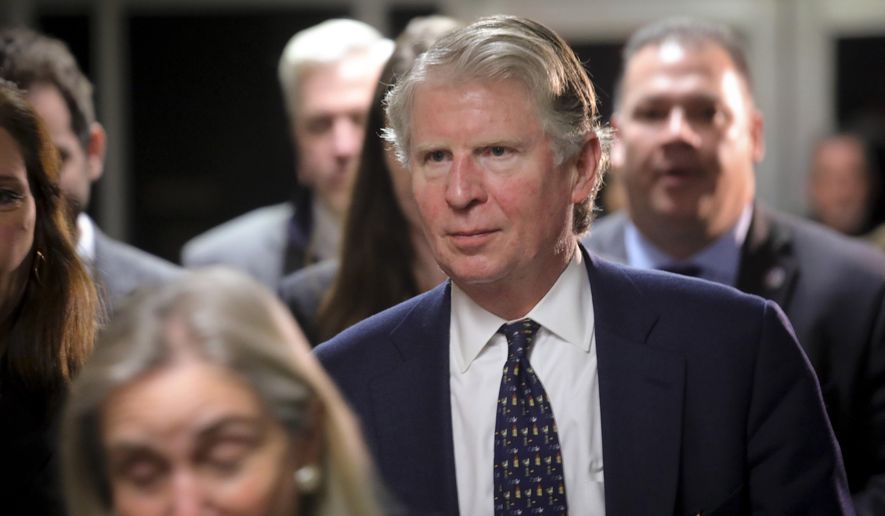NEW YORK (AP) - Manhattan District Attorney Cyrus Vance Jr., a veteran prosecutor overseeing a criminal investigation into former President Donald Trump, said Friday that he won’t seek reelection, opting against a primary fight with progressive candidates who say he’s a relic and not a reformer.
Vance made the announcement in a memo to staffers, ending months of speculation about his future and almost certainly guaranteeing it’ll be a brand-new D.A. who sees the Trump case through. His term expires at the end of the year.
Vance, a Democrat, counted Harvey Weinstein’s rape conviction a year ago among his crowning achievements but faced withering criticism over other high-profile cases, including dropping rape charges against French financier Dominique Strauss-Kahn in 2011 and declining to prosecute Ivanka and Donald Trump Jr. over fraud allegations in 2012.
“I never imagined myself as District Attorney for decades like my predecessors. I never thought of this as my last job, even though it’s the best job and biggest honor I’ll ever have. I said twelve years ago that change is fundamentally good and necessary for any institution,” Vance, 66, said in a written statement.
His decision not to seek reelection was widely anticipated, but he held off on making it official while the U.S. Supreme Court weighed whether his office could obtain Trump’s tax records. The court ruled in Vance’s favor last month.
Some of the Democrats campaigning to replace Vance want to slash the office’s budget, cut staff and skip prosecutions for a wider range of low-level offenses. Eight candidates are on the ballot for the party’s June primary, an election likely to decide Vance’s successor because Manhattan is so heavily Democratic.
As D.A., Vance ended most marijuana possession and turnstile jumping prosecutions, slashing the cases handled by his office by nearly 60%, to about 42,000 in 2019. He embraced diversionary programs for first-time offenders and established a unit to remedy wrongful convictions.
The Supreme Court ruling on Trump’s taxes was a capstone for Vance’s tenure as district attorney, ending an 18-month fight with Trump’s lawyers and bolstering a grand jury investigation that has drawn worldwide attention.
Vance’s investigation includes examining whether Trump or his businesses lied about the value of assets to gain favorable loan terms and tax benefits, and hush-money payments paid to women on Trump’s behalf.
Vance will lead that probe through the end of this year with his general counsel, Carey Dunne, who made appeals court arguments on the office’s behalf. He recently hired former mafia prosecutor Mark Pomerantz to assist in the probe.
The Trump case will likely be an early test for the next district attorney. And in the short term, legal observers say, Vance’s announcement could hasten the departure of prosecutors who’ve been loyal to him and won’t want to work for his successor.
The candidates have avoided speaking directly about the Trump matter, saying they didn’t want to prejudge an ongoing investigation.
“What’s really important is that if there’s a case or if it’s just an investigation that’s pretty far along that it’d be left in the hands of somebody who knows what they’re doing, who’s competent, who’s experienced, who has judgment and who doesn’t think politically,” said Daniel R. Alonso, Vance’s former chief assistant district attorney and now a partner at Buckley LLP.
Vance’s successor will be just the fourth elected district attorney in Manhattan in the past 80 years. Frank Hogan served for 31 years. Robert Morgenthau, under whom Vance served as an assistant district attorney, was in office for 34 years, until he was 90.
It’s one of the most high-profile prosecution jobs in the world, dramatized on TV’s “Law and Order” and “Blue Bloods.” The district attorney oversees a staff of 500 lawyers and has a budget of about $125 million.
A separate forfeiture fund bankrolled by Wall Street settlements and worth more than $800 million is used for grants to criminal justice and community organizations and big initiatives, such as testing backlogged rape kits.
Vance, whose father was President Jimmy Carter’s secretary of state, ran as a death penalty opponent and positioned himself as a criminal justice innovator, taking interest in national and global efforts to prevent cyberattacks, gun violence and the theft of artwork and antiquities.
After making a campaign pledge to re-examine the 1979 disappearance of 6-year-old Etan Patz, a 2012 tip led to a new suspect and ultimately a conviction.
Weinstein’s conviction in a landmark #MeToo case last year boosted Vance’s lagging legacy, giving him a career-defining win in a tenure clouded by concerns that he repeatedly gave powerful people special treatment.
They included sidestepping an effort to pursue charges against Weinstein in 2015 and striking a deal in 2016 so well-connected gynecologist Robert Hadden could avoid prison for allegedly sexually abusing patients. Vance’s office reopened the Hadden case amid public outcry last year, and the doctor was indicted on federal charges.
___
Follow Michael Sisak on Twitter at twitter.com/mikesisak




Please read our comment policy before commenting.